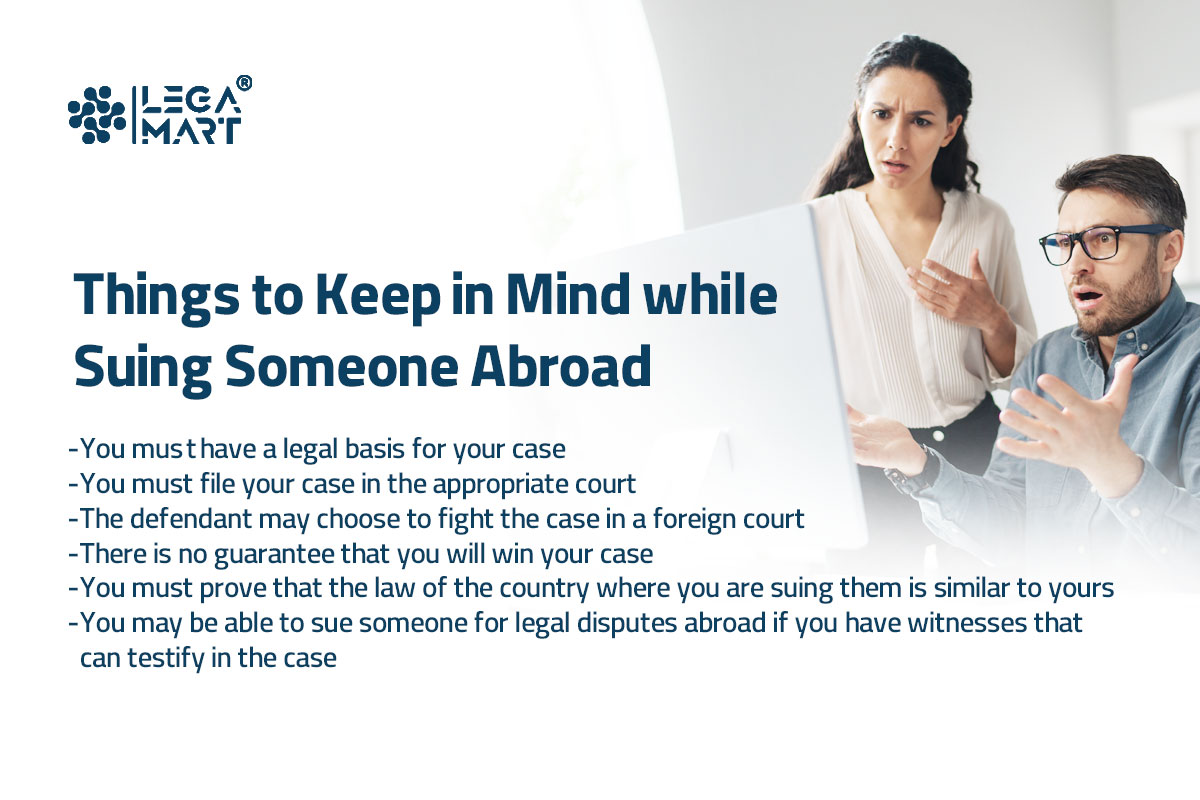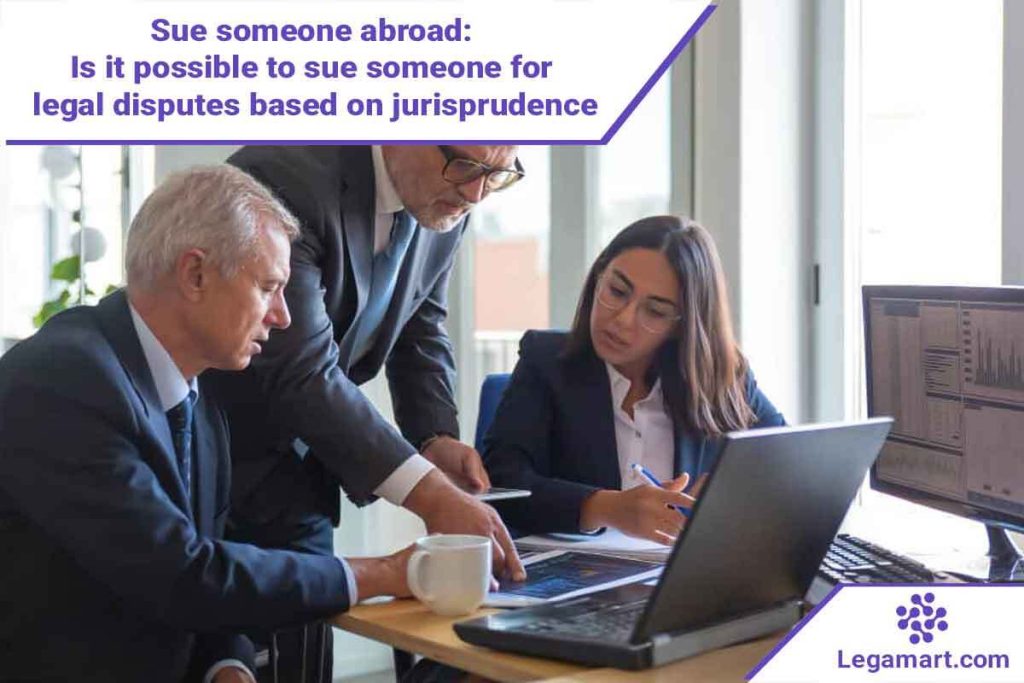Introduction
If someone has wronged you or committed a crime against you while you’re in a foreign country, you may wonder if it’s possible to take legal action against them. The answer is yes. It is possible to sue someone for legal disputes abroad based on jurisprudence. The process of suing someone abroad can be accomplished through litigation or arbitration. You might want to try and take legal action in your home country based on local laws, but this is not always possible.
To sue someone for legal disputes abroad, you may be required to adhere to specific steps before filing. The first step is determining the location of the person you want to sue and determining if that person has assets in your country. If that person has no assets in your country, it may be difficult to sue them in your country’s courts. The second step would be filing a lawsuit with the help of an attorney who has experience with international law or international arbitration. The lawyer will file paperwork with the foreign and local courts where they practice law to represent you in both countries.
The following article will discuss the possibility of suing someone for legal disputes abroad based on jurisprudence.
Should You Even Consider Suing Someone Abroad?
For any of our readers who have never considered suing someone abroad, here are some reasons why you should. The first reason is that you may not need to prove that the person has done something wrong; instead, you only need to show that they caused damage to you (or your business) while acting under their jurisdiction. You need to ensure that they are subject to the laws of your country.
An example would be a US citizen sued in France for copyright infringement.
Another reason to sue someone for a legal dispute abroad is to protect yourself from losing money in court fees. Paying a counsel to represent you in a suit in the United States may be expensive, whereas you can find someone who will work pro bono in a foreign country. If you decide to pursue the path, know the country’s law before you file suit. You may not get away with breaking the law, especially if you’re doing something illegal.
History of Suing People Abroad
The history of suing people abroad dates back to the early 1900s when American companies began to sue foreign countries for patent infringement. In the late 1800s, the United States government passed the Sherman antitrust act to protect consumers from monopolies and unfair business practices. However, the government did not enforce the mentioned act until after World War I. After the war, many European countries were left bankrupt and had to sell off their assets at low prices. These sales included patents and copyrights. Many American companies saw these opportunities and began to file lawsuits against these countries for copyright infringement.
You can sue someone abroad, if someone has used your content on social media.
Things to Keep in Mind While Suing Someone Abroad

Deciding to sue someone for legal disputes abroad is never easy. However, it’s possible to sue someone based on jurisprudence, i.e., the legal system of the country where you’re suing.
Suing someone abroad can be a complicated process. Different laws and procedures may apply depending on the country where you wish to sue the individual. It may be difficult to sue someone based on jurisprudence from another country.
Some important things to be watchful of when suing someone abroad:
- You must have a legal basis for your case.
- You must file your case in the appropriate court.
- The defendant may choose to fight the case in a foreign court.
- There is no guarantee that you will win your case.
- You must prove that the law of the country where you are suing them is similar to yours.
- You may be able to sue someone for legal disputes abroad if you have witnesses that can testify in the case.
Possible Juridical Issues
If a written agreement between you and your foreign adversary does not exist, you may be able to take legal action in the country whose law is most favourable in allowing this. If you are suing someone in your own country, you must determine which law applies in your jurisdiction. For instance, if you reside in the United States, you must decide if the law of diversity (NDAA) applies to this process. If it is, you will need a thorough understanding of the US federal law system and how they apply to contract law and libel in the USA.
If it is not the case, despite no evidence of a written agreement, and the home country’s law still orders this, you will need to select the law based on where you live. Diversity and international compatriot laws are two common issues determining which jurisdiction applies.
Case Study: Enforcing a Judgment of an English Court Against a Foreign Company or Individual
Suppose you take legal action against a foreign company, sole trader, or individual in an English court and are successful. In that case, the next step is to enforce your judgment if the other party does not pay immediately.
There is a bilateral agreement between England and Wales and the countries of the European Union, so all member countries recognize and implement the decisions of other member countries. A similar arrangement exists between England and Wales and the Commonwealth of Nations. It would be best if you appointed a lawyer or representative in a foreign country to execute the decision on your behalf.
No bilateral agreement exists with the rest of the world, so national or state law will apply. You usually have to start a new case to recover the debt in the other party’s country of origin, a default decision.
Avoiding Cross-Border Legal Disputes
Not much can be done to avoid cross-border legal disputes. However, there are some steps you can take to prevent more headaches than necessary:
- Assure that the contract reached between you and the other party is accurately reflected in writing;
- Consult lawyers to draft business terms that suit your business needs and that state that the agreement between you and the third party is governed by local law and that the courts have jurisdiction over any dispute;
- Deliver the other party with a copy of your terms and conditions before entering into the contract and make it clear that those terms govern the contract;
- Consider an arbitration clause in your terms of service or written agreement that states that the parties must arbitrate before prosecuting in the case of a legal dispute.
Challenges of Suing a Foreigner
Proving that the other party has committed a crime
To sue someone for legal disputes, you must prove that they did something wrong. If you want to sue a foreign national, you must show that they broke the local law. Most people don’t realize that just because you live somewhere doesn’t mean that you automatically get rights. You still have to follow directions and rules wherever you go. So if you were to say that I’m going to sue him for not paying me $100,000, it’s tough to do. It would take a lot of evidence to persuade a judge that he should pay you. Even if you have proof that he owes you money, it’s almost impossible for you to collect the money.
Proving damages
Secondly, you need to prove how much damage was done to you. You’ll probably lose if you try to sue someone over money unless you can prove that you lost more than the amount you’re suing them for.
Finding out where the opposing party lives
You’ll also need to know where he lives since courts only hear cases under their jurisdictions. And even then, they don’t always accept jurisdiction. For instance, if you want to sue a British citizen outside Britain but never met him in person, you won’t be able to do anything about it. He could move to a different country and become immune to legal action.
Is Personal Jurisdiction Over the Defendant Necessary When You Want to Sue Someone for Legal Disputes Abroad?

For a court to issue a valid judgment that imposes a personal obligation on a defendant, it is essential that the court has personal jurisdiction over the defendant. Personal jurisdiction refers to the authority a court has over a defendant. A court can establish personal jurisdiction if the defendant meets one of the following criteria:
- Physical presence;
- Residency or business presence;
- Consent; and
- Minimum contacts.
In the United States, for example, the Supreme Court established the basic rule that a personal judgment against a nonresident defendant, who has not served within the state and did not voluntarily submit to the court’s jurisdiction, is considered invalid. However, over time, the Supreme Court has made significant modifications to this rule. It is now recognized that under certain circumstances, a state court can acquire personal jurisdiction over a nonresident defendant even if they were not personally served within the state. This is possible if the defendant has sufficient “minimum contacts” with the state, ensuring the lawsuit does not violate traditional principles of fairness and justice.
It is important to note that foreign countries may interpret this issue differently than the United States, which may result in the US judgment being unenforceable abroad. Therefore, it is advisable to seek guidance from a local attorney in the foreign country early in the US legal proceedings, well before any judgment is rendered.
Convincing a court that you have a case
You must convince a judge that you should win. Your suit should be maintainable. To do this, you must present the judge with enough evidence to help your case.
Hiring a lawyer
And finally, you’ll need to hire an attorney specializing in international law. These lawyers know what evidence you’ll need to make your case and can help you prepare it.
To seek further assistance relative to suing someone/corporation abroad, our experts and experienced lawyers at LegaMart can help you connect with the right people and assist you immediately.
How to Sue Someone Abroad When You Were Hurt in Another Country?
When travelling to another country, whether for business or pleasure, there are inherent risks involved. If you suffer harm due to someone else’s negligence while in another country, you may need to sue someone for legal disputes to seek compensation. However, international personal injury claims can be as intricate as anticipated, as they require understanding the process of suing under the laws of another country.
First of all, it is crucial to determine ownership of the property where an injury occurred. However, in some situations, like traffic accidents, vehicle ownership may hold greater significance. For example, if a resort in Switzerland is owned by a company from the US or another country, you may have the choice to file a lawsuit either in Switzerland or in the US.
Additionally, in cases where you sustain an injury caused by your tour company, hotel, or an entity with whom you have signed a terms of service contract, the specific contract terms may dictate the jurisdiction where you are required to file a lawsuit if you intend to sue. Such contracts often include forum selection clauses stipulating that any legal action must be initiated in a particular location. Additionally, they may include arbitration agreements, in which you consent to resolving disputes through arbitration rather than pursuing litigation in a court of law.
If the claim is of a personal injury, it is vital to understand the fundamental aspects to base your claim. Generally, every personal injury claim in every jurisdiction revolves around two fundamental aspects; damages and Liability. Furthermore, specific laws must be taken into consideration for your personal injury case, including:
- Jurisdiction: It is crucial to file your lawsuit in the appropriate country and court. Typically, the jurisdiction will be where the injury occurred. However, various factors, such as the location and the party you are suing, may influence the jurisdiction. In cases involving companies strongly connected to the United States, it might be possible to file a lawsuit in the United States. Consulting with your attorney will help determine the most suitable court based on the circumstances of your case.
- Statute of limitations: It is imperative not to delay seeking legal counsel. In most cases, there is a limited timeframe within which you must file your lawsuit to preserve your rights.
Once the outgoing aspects have been established, you can initiate the process of filing your case with the help of your attorney, who will guide you on the processes involved and the required documentation.
Frequently Asked Questions (FAQ)
In the absence of any agreement, which country’s law applies, and where can I take legal action?
When you sue someone for legal disputes abroad, where there is a contract with a party from the European Union (EU), you have the choice to sue the defendant in their local courts or file a lawsuit in the courts of the EU state where the contract was executed or was meant to be executed. If the company or individual you wish to sue is outside the EU, you would generally need the court’s permission to serve the claim in a foreign country. This legal process serves as a means to notify the other party of the claim and summon them to defend themselves in the designated country, allowing you to effectively sue someone for legal disputes.
What if a claim is made against me or my company in foreign courts?
If you receive notice of legal proceedings in another country against you or your company, promptly seeking legal advice from solicitors in England or Wales is crucial. These solicitors can help by connecting you with appropriate foreign lawyers or acting as intermediaries with foreign lawyers on your behalf.
Obtaining advice from a lawyer who practices in the country where the lawsuit is being filed is vital. They possess the necessary expertise to assess whether you can challenge the other party’s decision to initiate legal proceedings in that specific country. Furthermore, they can guide the necessary steps to prevent a judgment from being entered against you.
Conclusion
To conclude, if you are going to sue someone for legal disputes abroad, you must consider where you live, where the defendant lives, which court(s) has jurisdiction over your dispute, and why you want your case to be heard.
For any of our readers who have never considered suing someone abroad, let me explain why you should consider it. The first reason is that you may not need to prove that the person has done something wrong; instead, you only need to show that they caused damage to you (or your business) while acting under their jurisdiction. It means you don’t need to prove where they live, their state, or even if they’re still alive. You need to ensure that they are subject to the laws of your country.
An example would be a US citizen sued in France for copyright infringement. Another reason to sue someone for legal disputes abroad is to protect yourself from losing money in court fees. Paying a counsel to represent you in a suit in the United States may be expensive, whereas you can find someone who will work pro bono in a foreign country. If you decide to pursue the path, know the country’s law before you file suit. You may not get away with breaking the law, especially if you’re doing something illegal.
Uncover the steps and procedures for immigration to different nations, with a focus on Turkey to Norway and US to Portugal, in Legamart’s insightful articles.




